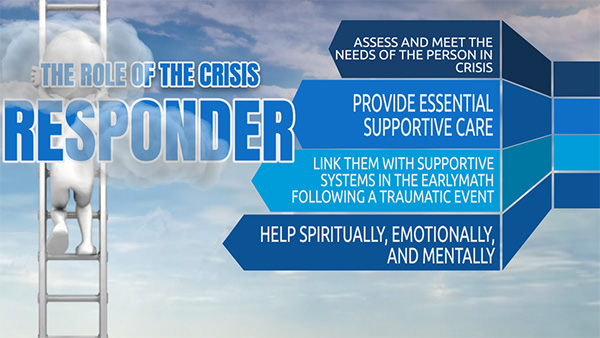 What to do for intervention
What to do for intervention
- Discuss suicide openly – normalize the feelings and thoughts.
- Expand their support system: get friends and family involved.
- Introduce alternative thinking and options.
- Act assertively – get medical help if necessary: call 911.
- Remove access to lethal weapons, methods of self-harm.
- Contract for no suicide and community care.
- National suicide hotline is 800-273-TALK
Treatment for Violent and Potentially Violent People
- Emphasize consequences of acting out behavior—is impulsive, amygdala-driven.
- Talk directly about options to restrain their hurt, fear, rage, etc.
- Be concerned about weapons and access to weapons.
- Make sure you have a way of escape and ongoing physical safety.
- Never meet alone – make sure someone else is nearby.
- Warn police and/or intended victim if necessary.
- Call 911 if threat is imminent.
Spiritual and Psychological First Aid
When people experience trauma or unexpected loss, it can have a profound and long-term negative impact on a person
- Depression
- Destruction
- Addiction
- Poor choices 2
These effects can be mitigated by the help of crisis responders
- Give hope
- Offer stability
- Support so that a person does not get stuck or make harmful decisions
Acute Stress Response
Fight, flight or freeze is the physical and psychological reaction to a perceived threat, harmful event, or dangerous situation
This is the emergency response system common to all mammals and designed by God
This is an unconscious instant reaction
- Stress hormones are released
- Blood flow changes to essential functions
- Prefrontal cortex goes offline so a person has impaired thinking, processing and language skills
- Amygdala instinctively responds
REM stage sleep is required to recover from trauma
The “alarm” goes off and the body returns to normal typically within 48 hours
Post-traumatic stress disorder may occur if the “alarm” does not turn off after 30 days
- Stress goes on for too long, and is no longer normal or helpful
Role of the Crisis Responder
Crisis Response
Definition: The compassionate and supportive presence by another person designed to mitigate the acute distress someone feels after a traumatic event
- Assess and meet needs of the person in crisis
- Provide essential supportive care
- Link them with other support systems in the early aftermath of the traumatic event
- Help spiritually, emotionally, and mentally
What helps people?
- Do not go in with preconceived notion on how a person should be reacting
- Do not judge
- Active listening
- Practical acts of service
 What to do for intervention
What to do for intervention